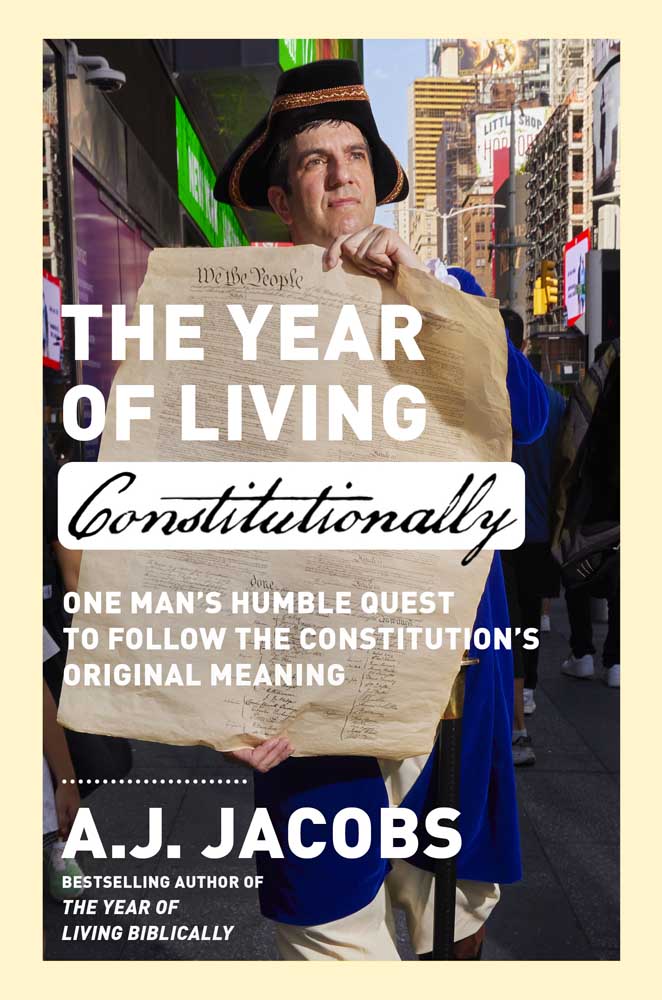Book reviews: Learning by living like the Founding Fathers
Published 9:00 pm Friday, July 5, 2024

- books-FoundingFathers
How, in the Year of Our Crisis 2024, do we feel about the Founding Fathers?
For many Americans, they are inspirational figures deserving of uncomplicated reverence — the creators of modern liberal democracy. For others, they’re the monsters who prolonged slavery in the United States, the chauvinists who excluded women from the franchise and the morons whose rules would grant as many senators to Wyoming as California, despite its having one sixty-eighth of the population.
Two humorous new books probe these conflicting attitudes while warning of the perils of simplistic, binary thinking. What do their authors think we might still learn from the Founders — and from the Constitution those men entrusted so hopefully to posterity?
A.J. Jacobs, in “The Year of Living Constitutionally,” is initially dubious. “Should we be skeptical of this set of rules written by wealthy racists who thought tobacco-smoke enemas were cutting-edge medicine?” he asks. Surely yes …?
His method for assessing the continuing utility of the Constitution is to “get inside the minds of the Founding Fathers.” Jacobs wants to be “the original originalist” — that is, to follow the doctrine of constitutional interpretation that favors the semantic and political frameworks prevalent at the time it was written. Armed with a tricorn hat, goose quill pen and a large supply of candles, he does his best to live 1790s style and exercise his Constitution-given rights, whether it be carrying a musket, quartering a soldier, or gaining a letter of marque and reprisal and becoming a privateer. What larks.
Jacobs’s gonzo approach, while occasionally silly, is not ineffective. In testing the Constitution’s more outdated elements, he shows how stupid it can be to take 237-year-old rules literally. I was surprised to discover that even the clearly worded rights listed in the First Amendment were interpreted radically differently in the late 18th century. Anti-cursing laws, statutes banning theater and the imprisonment of members of Congress for dissent were all basically kosher — imagine!
Jacobs’s point isn’t that the Founders were maniacs or that we should ditch the Bill of Rights. Rather he’s building a case for living constitutionalism, the philosophy that the founding documents’ basic tenets can remain a guide even as society and technology change. At a time when a majority on the Supreme Court favors its opposite, originalism (at least when convenient), and is actively attacking freedoms such as reproductive rights and the power of federal agencies to protect the environment, it’s vital to question the philosophical underpinnings of their approach.
Ben Franklin is the subject of Eric Weiner’s book “Ben & Me: In Search of a Founder’s Formula for a Long and Useful Life.” Weiner, like Jacobs, searches in the past for guidance on how we should live now and finds, in Renaissance man Franklin, an inspiring example.
Among his many admirable qualities, per Weiner, were his stoicism and the “modest diffidence” (Franklin’s words) he practiced in conversation and debate — in stark contrast with today’s feral hyperpartisanship. These are, of course, also among the essential tools of diplomacy, and luckily, when his country was in direst need, Franklin was at the height of his powers.
While there’s much to admire about Franklin, he was also one of the slaveholding Founders. Indeed it took him till 1785 to emancipate his last enslaved person. Weiner ties himself in knots trying to demonstrate, through Franklin’s writings, the gradual shift in his thinking, but it certainly took him a while to become the “all-in abolitionist” Weiner describes.
Though there are unignorable limitations in mining the early republic for guidance, there’s still plenty to learn from the past. Though Weiner focuses largely on Franklin, the lives of most Founding Fathers illustrate a certain mutability of intention and ideology. And this is good! Flexibility and willingness to compromise are desirable qualities in politicians, especially in an era of chronic entrenchment and bitter division.








